Black Women Front and Center and Behind-the-Scenes in Politics
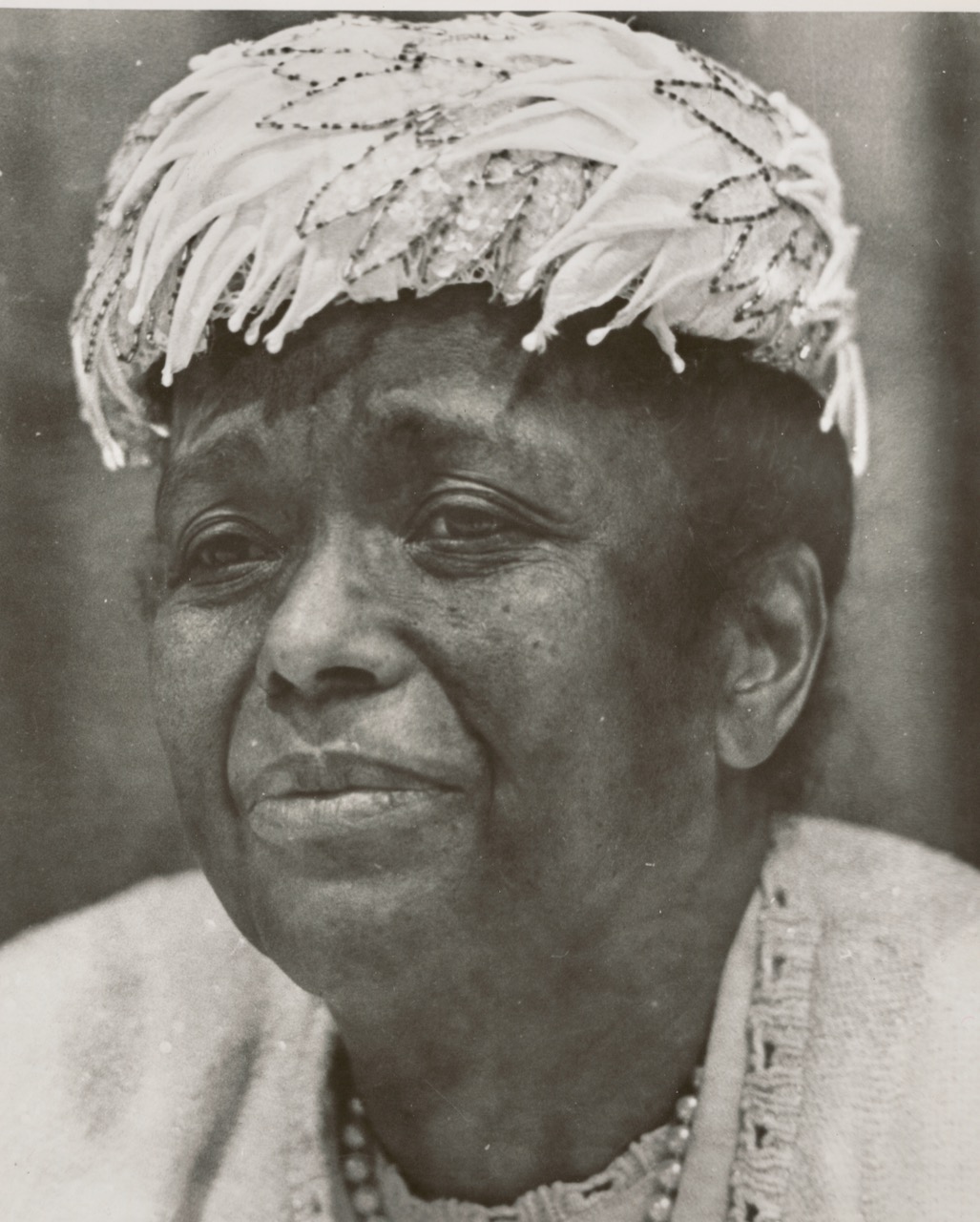
Former Vice President Joseph Biden’s selection of Sen. Kamala Harris, who is of Black and South Asian descent as his running mate for the 2020 Election, brought renewed attention to the history of Black women’s participation in politics.
Black women—whose efforts have been underappreciated or ignored—fought to secure all women's right to vote, advocated for racial justice and equality, spoke out against police brutality, and pushed back against voter suppression.
Explore the Schomburg Center’s online collections and get reading recommendations to learn about some of the legendary women and the current voices continuing the call for justice, and protecting civil and human rights.
DIGITAL COLLECTIONS
Ella Baker's name isn’t as synonymous with the Civil Rights era as the male leaders who claimed the public spotlight, but her work made many of the movement’s great strides possible.
Baker (1903-1986) had an exceptional gift for inspiring people to take an active role in their liberation and was a tireless organizer and catalytic force. Her skills and knowledge propelled her into leadership roles and made her a go-to person for organizations such as the National Association for the Advancement of Colored People (NAACP), the New York Urban League, and the Southern Christian Leadership Council (SCLC).
Baker also has a significant connection to Harlem and the Schomburg. Baker, who moved to Harlem in 1927, was a staff member at the 135th Branch of The New York Public Library. She taught adult education classes and developed consumer education and literacy programs for young mothers in 1934. Today, the building is part of the Schomburg Center complex.
The Manuscripts, Archives, and Rare Books Division (MARB) holds the Ella Baker Papers. The collection offers a glimpse into Baker’s life as an activist. It also reveals why leaders such as A. Philip Randolph and Dr. Martin Luther King Jr. sought her input.
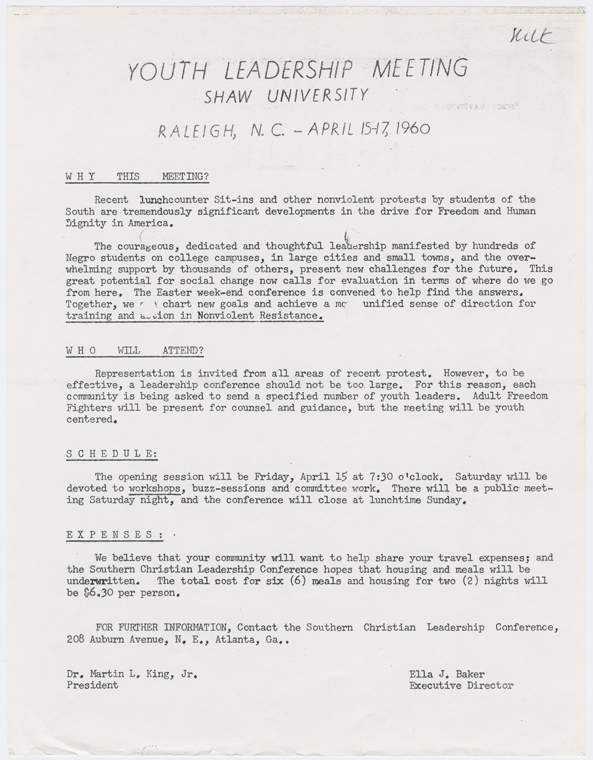
Her papers span six decades and provide evidence of her long history as an activist, organizer, and advocate. Baker was influential in expanding NAACP membership across the South. She also advocated for the leadership and talent that women brought to the cause. Likewise, she recognized the power of young people in shaping movements.
“This great potential for social change now calls for evaluation in terms of where do we go from here,“ stated a 1960 flyer from the digital collection for a Youth Leadership meeting at Shaw University, bearing the names of Baker and Dr. Martin Luther King Jr. With her encouragement, youth activists at this meeting founded the Student Nonviolent Coordinating Committee, better known as SNCC.
“I think today’s activists, especially those who truly value grassroots organizing, take many cues from Ella Baker’s work,” said Joy Bivins, associate director of Collections and Research Services at the Schomburg Center. “Her work for freedom never stopped whether she was connected to an organization, shaping campaigns, or supporting the work of other activists.”
Her impact led SNCC leader Stokely Carmichael, who later changed his name to Kwame Toure, to claim that “the most powerful person in the struggle for civil rights in the 1960s was Miss Ella Baker, not Martin Luther King," Bivins added.
The Schomburg Center’s Photographs and Prints Division includes an image of legendary activists such as Mary McLeod Bethune and Mary Church Terrell.
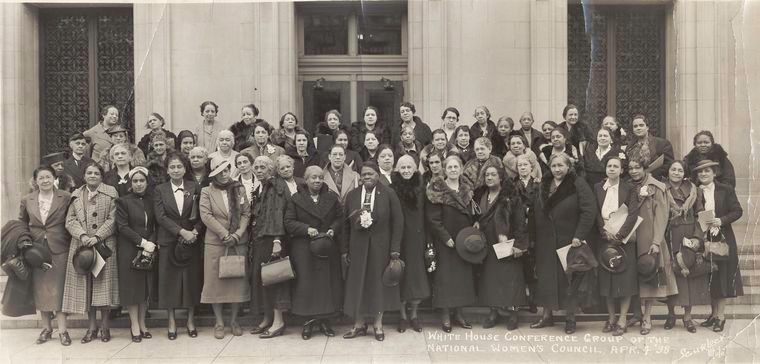
On April 4, 1938, over 60 Black women gathered for the White House Conference on Governmental Cooperation in the Approach to the Problems of Negro Women and Children. The group included Bethune, educator and founder and President of the National Council of Negro Women (NCNW), and Terrell, also an educator and advocate for civil and women’s rights. Bethune founded the organization in 1935 to bring together Black women's skills, backgrounds, and experiences under one entity.
“One area of concern to NCNW was the lack of federal government jobs available to Black women,” said Michael Mery, acting curator of the Photographs and Prints Division. “When Bethune, also a member of the White House public policy group known as the ‘Black Cabinet,’ wanted to conduct a White House conference on this issue she contacted First Lady Eleanor Roosevelt in early 1938, and spoke with her on the significance of holding this gathering in a governmental setting to give prestige and history to it.”
The group met with Roosevelt and female administrators from Federal agencies. It led to an ongoing dialogue between the NCNW and the White House for more Black female administrators in upper-level government positions.
LIVESTREAM CONVERSATIONS
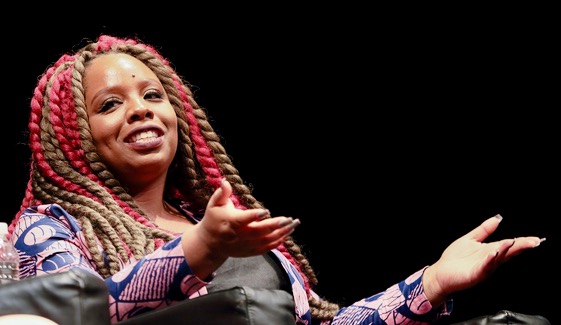
The Schomburg Center’s Livestream archive includes talks with Black Lives Matter cofounder Patrisse Cullors and author Carol Anderson, who writes about Black voter suppression.
In her 2020 conversation with Kadiatou Tubman, manager of the Schomburg Education Programs, Cullors discussed the writings and experiences that shaped her life.
“We are at a hard moment in history,” Cullors said. “We get to be the people to re-imagine, and recreate, and rebuild what this country can and should look like.”
Watch the full conversation of When They Call You A Terrorist (Young Adult Edition): A Story of Black Lives Matter and the Power to Change the World.
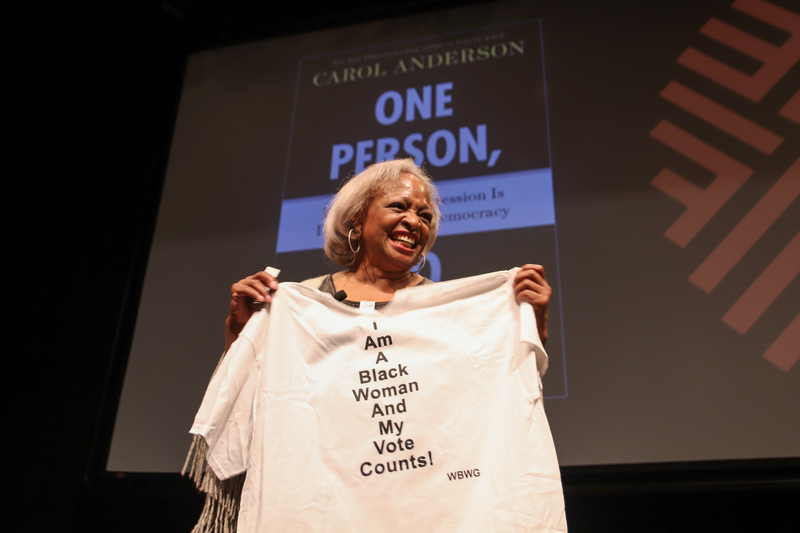
In her 2018 talk, Anderson, author of One Person, No Vote: How Voter Suppression Is Destroying Our Democracy, discussed tactics used to undermine the Black vote.
Anderson recounted an incident where Albert Turner, his wife Evelyn, and fellow activist Spencer Hogue Jr. were charged with mail fraud and conspiracy to commit voting fraud after expanding Black voter turnout through absentee ballots in Alabama in 1985. The three were later acquitted.
Watch “Talks At the Schomburg: A History of Voter Suppression” to view Anderson’s conversation with Dr. Khalil Gibran Muhammad, professor of History, Race and Public Policy at Harvard Kennedy School and former Schomburg Center director.
BOOK PICKS
“These books signify an entry point into the lives of Black women who were thought leaders, caremakers, and fighters who have always been essential to the struggle for freedom,” said Zenzele Johnson, manager of The Ella Baker Initiative at the Schomburg Center.
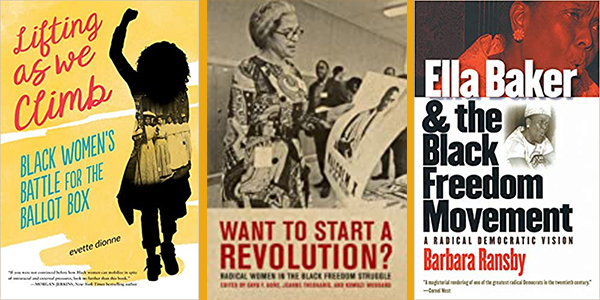
“Want To Start a Revolution? serves as a mosaic of essays about radical Black women while Ransby’s book hones in on the life of Ella Baker, and Dionne’s book should be essential reading to every middle and high school student in their History class,” she said.
“The more we know about the work (and) resistance of the women that came before us, the more we see and understand how much we have to do. And, within that, we are not alone. These everyday women left incredible radical markers to continue forward,” Johnson said.
Download NYPL’s free e-reader app SimplyE to explore its collection of e-books and audiobooks.
Sign up for Schomburg Connection to get the latest updates on events, blog posts, library guides, and more!
Join the Schomburg Center on Facebook, Instagram, and Twitter.
Read E-Books with SimplyE
 With your library card, it's easier than ever to choose from more than 300,000 e-books on SimplyE, The New York Public Library's free e-reader app. Gain access to digital resources for all ages, including e-books, audiobooks, databases, and more.
With your library card, it's easier than ever to choose from more than 300,000 e-books on SimplyE, The New York Public Library's free e-reader app. Gain access to digital resources for all ages, including e-books, audiobooks, databases, and more.
If you don’t have an NYPL library card, New York State residents can apply for a digital card online or through SimplyE (available on the App Store or Google Play).
Need more help? Read our guide to using SimplyE.